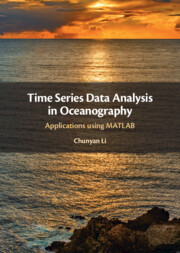Book contents
- Time Series Data Analysis in Oceanography
- Time Series Data Analysis in Oceanography
- Copyright page
- Contents
- Preface
- Acknowledgments
- 1 Introduction
- 2 Introduction to MATLAB
- 3 Time and MATLAB Functions for Time
- 4 Deterministic and Random Functions
- 5 Error and Variability Propagation
- 6 Taylor Series Expansion and Application in Error Estimate
- 7 Spherical Trigonometry and Distance Computation
- 8 A System of Linear Equations and Least Squares Method
- 9 Base Functions and Linear Independence
- 10 Generic Least Squares Method and Orthogonal Functions
- 11 Harmonic Analysis of Tide
- 12 Fourier Series
- 13 Fourier Transform
- 14 Discrete Fourier Transform and Fast Fourier Transform
- 15 Properties of Fourier Transform
- 16 More Discussion on the Harmonic Analysis and Fourier Analysis
- 17 Effect of Finite Sampling
- 18 Power Spectrum, Cospectrum, and Coherence
- 19 Window Functions for Reducing Side Lobes
- 20 Convolution, Filtering with the Window Method
- 21 Digital Filters
- 22 Rotary Spectrum Analysis
- 23 Short-Time Fourier Transform and Introduction to Wavelet Analysis
- 24 Empirical Orthogonal Function Analysis
- References
- Index
3 - Time and MATLAB Functions for Time
Published online by Cambridge University Press: 21 April 2022
- Time Series Data Analysis in Oceanography
- Time Series Data Analysis in Oceanography
- Copyright page
- Contents
- Preface
- Acknowledgments
- 1 Introduction
- 2 Introduction to MATLAB
- 3 Time and MATLAB Functions for Time
- 4 Deterministic and Random Functions
- 5 Error and Variability Propagation
- 6 Taylor Series Expansion and Application in Error Estimate
- 7 Spherical Trigonometry and Distance Computation
- 8 A System of Linear Equations and Least Squares Method
- 9 Base Functions and Linear Independence
- 10 Generic Least Squares Method and Orthogonal Functions
- 11 Harmonic Analysis of Tide
- 12 Fourier Series
- 13 Fourier Transform
- 14 Discrete Fourier Transform and Fast Fourier Transform
- 15 Properties of Fourier Transform
- 16 More Discussion on the Harmonic Analysis and Fourier Analysis
- 17 Effect of Finite Sampling
- 18 Power Spectrum, Cospectrum, and Coherence
- 19 Window Functions for Reducing Side Lobes
- 20 Convolution, Filtering with the Window Method
- 21 Digital Filters
- 22 Rotary Spectrum Analysis
- 23 Short-Time Fourier Transform and Introduction to Wavelet Analysis
- 24 Empirical Orthogonal Function Analysis
- References
- Index
Summary
As mentioned earlier, time series data must include time stamps. It may seem trivial, but some attentions are needed to properly use time to avoid mistakes. The objective of this chapter is to review a few concepts of time so that when an analysis of time series data is performed, there is less chance to make mistakes with respect to data consistency, the result of analysis, and interpretation. We will discuss some basic astronomical concepts related to time; different definitions of day; and time measurements, GMT, and UTC. We will learn using MATLAB to construct a time sequence from civil time or time strings, i.e. the year, month, day, hour, minute, and second to a real number of time and vice versa. We will also briefly discuss the Positioning, Navigation, and Timing (PNT) data from the Global Positioning System (GPS).
Keywords
Information
- Type
- Chapter
- Information
- Time Series Data Analysis in OceanographyApplications using MATLAB, pp. 53 - 77Publisher: Cambridge University PressPrint publication year: 2022
